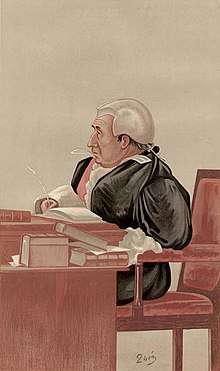Roland Vaughan Williams
Sir Roland Lomax Bowdler Vaughan Williams (31 December 1838 – 8 December 1916) was an English lawyer and judge. From 1897 to 1914 he was a Lord Justice of the Court of Appeal. He was an authority on the laws of bankruptcy, and wrote a book that remained the standard English work on the subject for many years.
Sir Roland Vaughan Williams | |
|---|---|
 | |
| Lord Justice of Appeal | |
| In office 1897–1914 | |
| Justice of the High Court | |
| In office 1890–1897 | |
| Personal details | |
| Born | Roland Lomax Bowdler Vaughan Williams 31 December 1838 Bloomsbury, London |
| Died | 8 December 1916 (aged 77) Abinger, Surrey |
| Spouse(s) | Laura Susannah Lomax |
| Children | 3 |
| Relatives | Edward Vaughan Williams (father) Ralph Vaughan Williams (nephew) |
| Residence | High Ashes, Abinger, Surrey |
| Education | Westminster School |
| Alma mater | Christ Church, Oxford |
Life and career
Vaughan Williams was born in Bloomsbury, London, the fifth son of the judge Sir Edward Vaughan Williams and his wife, Jane Margaret, née Bagot. Among his brothers was Arthur, who became a clergyman and was the father of the composer Ralph Vaughan Williams. He was educated at Westminster School and Christ Church, Oxford, graduating in 1860.[1]
Vaughan Williams was called to the bar in 1861 and was a barrister of Lincoln's Inn. In 1870 he published The Law and Practice of Bankruptcy, a work that was for many years the standard English authority on the subject.[2] He became a Queen's Counsel in 1889.
The following year was raised to the bench as a Judge of the Queen's Bench Division, from which he was promoted in 1897 to be a Lord Justice of the Court of Appeal; he was appointed to the Privy Council at the same time.[1] In 1906 he was appointed chairman of the Royal Commission on the disestablishment of the Church in Wales; the success of the commission and the smooth implementation of its recommendations were largely attributable to him.[2]
In 1865 he married Laura Susannah, daughter of Edmund Lomax of Surrey; they had one son who survived to adulthood and two who did not.[2]
Vaughan Williams died at his home in Abinger, Surrey, at the age of 77.[2]
Notable cases
High Court
- Re Anglo-Austrian Printing & Publishing Union [1895] 2 Ch 891, concerning recovery of assets under a misfeasance action
Court of Appeal
- Re Peveril Gold Mines Ltd [1898] 1 Ch 122, regarding the power of a shareholder to wind-up an insolvent company
- Allen v Gold Reefs of West Africa Ltd [1900] 1 Ch 656 (dissenting), on amendments to the articles of association which were not in the interests of the company as a whole
- Krell v Henry [1903] 2 KB 740, one of the "Coronation cases" relating to frustration of purpose under contract law
- Re Yorkshire Woolcombers Association Ltd [1903] 2 Ch 295, arguably his most famous judicial contribution, formulating the description of a floating charge
- Re Atkinson [1904] 2 Ch 160, on apportioning entitlements between a life tenant and remainderman in a trust
- Hirachand Punumchand v Temple [1911] 2 KB 330, relating to part payment of debts
- Chaplin v Hicks [1911] 2 KB 786, on damages for loss of chance
Notes
- "Williams, Rt Hon Sir Roland Lomax Bowdler Vaughan", Who Was Who, Oxford University Press, 2014 retrieved 10 October 2015 (subscription required)
- Jones, N. G. "Williams, Sir Edward Vaughan (1797–1875)", Oxford Dictionary of National Biography, Oxford University Press, retrieved 10 October 2015 (subscription or UK public library membership required)